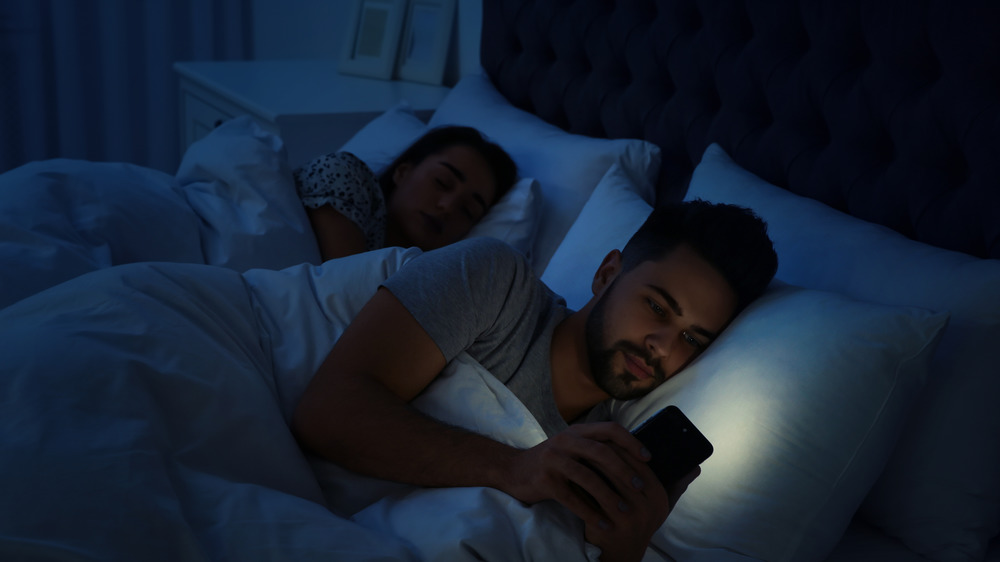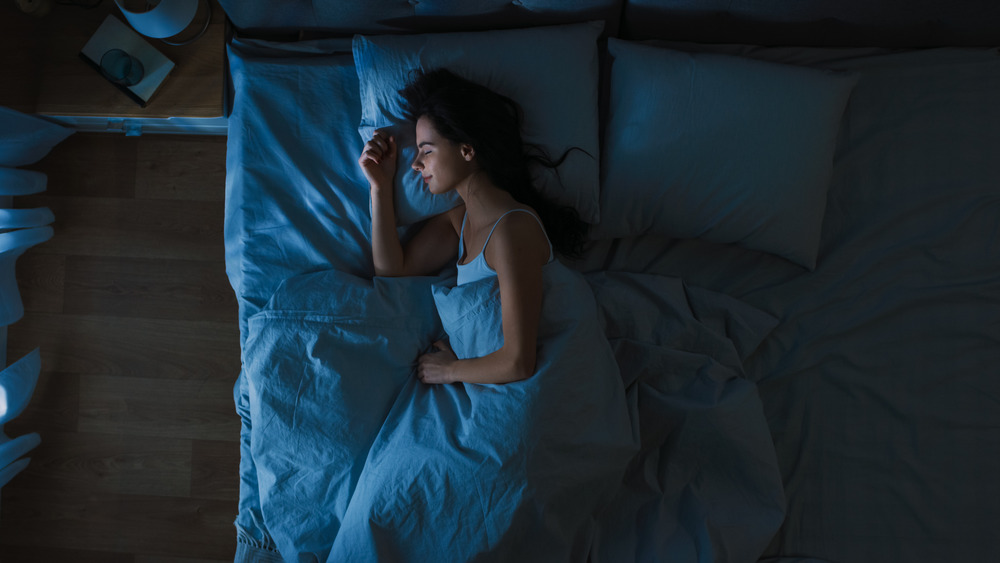The Sleep Disorder You Might Have Right Now
You don't have nightmares waking you up in a cold sweat. You don't sleepwalk. Your legs aren't moving around restlessly in bed. You don't stop breathing while asleep. So you think you're good when it comes to sleep, and you're disorder-free. Not so fast.
Answer this: Do you lie in bed, eyelids heavy, clasping your phone, and swiping through the new gadgets on Amazon? Or are you propped up by pillows, staring at the TV through half-opened eyes while the clock ticks irrevocably on toward morning? All while knowing you have to be up early tomorrow? Well, then there's a good chance you do have a sleep disorder called Revenge Bedtime Procrastination. It may sound odd, and you may have never heard of it, but like other sleep disorders, it has ramifications that may affect your daily activities and even your health.
The name has its origins in China, where it's referred to as "sleepless night revenge" (per Glamour), an expression of frustration with long days of work that leave little time for enjoyment, according to the Sleep Foundation. The revenge component relates to getting retaliation on those endless daytime hours that require us to work, with no free time to ourselves. And so we squeeze every last moment we can out of the nighttime, even if we drop the phone on our face with sudden drifts into sleep, continuing to scroll, watch, play, whatever for us represents mindless enjoyment.
Why we indulge in Revenge Bedtime Procrastination
Since being introduced to the U.S. on Twitter last year, the phrase Revenge Bedtime Procrastination has spread like wildfire over social media, with many people admitting to engaging in its behaviors, such as delaying bedtime and thereby reducing total sleep time, staying up later for no real reason, and being aware that blowing past bedtime could possibly cause problems the next day or beyond.
Unlike other sleep disorders, Revenge Bedtime Procrastination is a deliberate choice. Why do we knowingly sabotage our sleep? It could be a way to try to reduce stress, according to Vaile Wright, senior director of health care innovation at the American Psychological Association (via CNN). The COVID-19 pandemic has blurred the lines between our jobs and free time, as so many people are now working from home, and maybe even homeschooling their children. Relaxation and "me" time are at a premium, so indulging in mindless activities past bedtime seems to be a way to claim part of the day for oneself.
Perhaps we're lonely as well. In-person human connection has been effectively blocked for over a year, and being social creatures, we need it. "Social media provides us with ... a conduit to other people's social lives that especially right now is less available," Ashley Whillans, Ph.D., a researcher and behavioral scientist at Harvard Business School, told Glamour. Late-night posting and scrolling through messages may be a way to make up for the social distancing requirements in real life and relieve the loneliness.
The consequences of Revenge Bedtime Procrastination
Revenge Bedtime Procrastination leads to a wide assortment of problems when you're awake because it causes sleep deprivation, and therefore the mind and body can't fully recharge. Possible problems associated with Revenge Bedtime Procrastination include deficits in thinking, memory, and decision-making; daytime sleepiness, which raises the risk of drowsy driving and lowers productivity; greater irritability and difficulty regulating emotions; a higher susceptibility to such physical conditions as cardiovascular disease and diabetes; and lowered immune function.
Consequences can happen quickly, as well as build up over time, leading to long-term mental and physical health problems. Ongoing sleep deprivation can even be lethal. "Chronically sleeping less than six hours [per night] gives you almost a three to five times higher likelihood of mortality in the next five years," Abhinav Singh, M.D., a sleep physician and medical director of the Indiana Sleep Center in Greenwood, Indiana, told Health.
Even the sleep that you do get after indulging in phone activity past your bedtime, for instance, can be compromised. A phone screen emits blue light, which interferes with the production of melatonin, the hormone associated with control of the sleep-wake cycle. A study conducted by Harvard researchers found that 6.5 hours of exposure to blue light suppressed melatonin secretion twice as long as exposure to green light, according to Harvard Health Publishing.
How to overcome Revenge Bedtime Procrastination
Think comprehensively about your sleep habits and environment. To start, instead of trying to blow past bedtime, prepare for it by establishing a routine that helps you wind down. Maybe that includes a bath, reading a book, and meditating. Having a routine that feels automatic will reduce the impulse to stay up later, while relaxation techniques will help lessen the stress that can lead to Revenge Bedtime Procrastination. Be sure to adhere to the same bedtime and wake-up time, even on days off.
Keep your bedroom environment inviting, to woo you to sleep: dark, quiet, and cool, with a comfortable mattress and bedding. Make your bed off-limits for electronic devices, and turn them off at least half an hour before bedtime.
Perhaps most essential for beating Revenge Bedtime Procrastination is to make small adjustments during the day, so you're not drawn to shoehorn enjoyment into the late night hours. Schedule 15-minute breaks to relax, and perhaps to meditate. Not being afraid of your thoughts may help you avoid the mindless activity later on, according to Aliza Shapiro, a clinical social worker and therapist in Manhattan, as Revenge Bedtime Procrastination can be fueled by a desire to avoid facing uncomfortable thoughts and feelings. You exhaust yourself scrolling or watching TV and eventually fall asleep without having to actually think or feel.
What's better for your physical and emotional health is to check in with your feelings throughout the day, Shapiro said, so that bedtime is not fraught with negativity. This practice will ultimately help you slip into sweet deep sleep.




